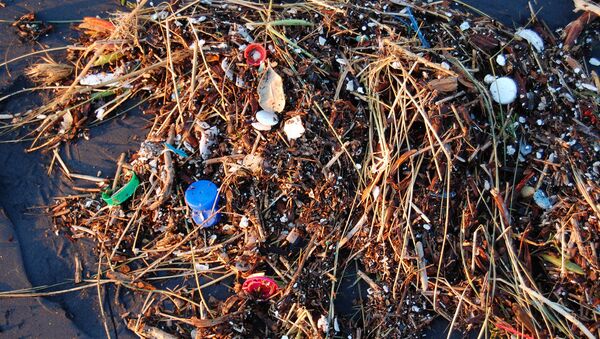"’How bad for the environment can throwing away one plastic bottle be?’ 30 Million People Wonder," asked the Onion in 2010. On Monday, researchers from the World Economic Forum answered that pointed and humorous question with a pointed and serious answer. Their study found that there may be more plastic than fish in the world’s oceans by 2050.
It is no laughing matter for the researchers, who suggest that the proliferation of plastic garbage threatens not only specific species, but the entire oceanic ecosystem and, hence, the entire planet. Genevieve Abedon, waste prevention campaign coordinator at Californians Against Waste, is among those experts sounding the alarm.
"Reducing plastic waste is a really big issue. Plastic in our oceans affects anything and everything, including all humans and animals," Abedon said.
Scientists have discovered that plastic in the ocean has a severe impact on the marine environment, with birds, whales, and sea turtles often mistaking the material for food. These impacts, scientists believe, can spread along the food chain to impact human health.
Unconsumed plastic products clump together to form huge gyres in the form of large rotating ocean currents hundreds of miles wide, that can throw the entire global climate out of alignment. Today, billions of pounds of plastic bound together currently covers nearly 40 percent of the world’s ocean surface.
The magnitude of the problem grows rapidly with each passing day, but environmental proponents still see hope for change. Mark Murray, executive director of Californians Against Waste, said, "the discovery of the Pacific Gyre brought plastic pollution to the forefront in terms of California policy issues."
Murray observed that, as the environmental risks and damages wrought by single-use plastic products are acknowledged, policy-makers are moving toward phasing out these products in favor of fast-acting biodegradable substances.
Murray also suggested that the plastic bag is a scourge on the planet. "The environmental consequences of a plastic bag far exceed [its] utility. You use it for 15 to 20 minutes for groceries, but it continues to persist as pollution in the ocean forever."
The same argument has been employed on college campuses to advocate against single-use water bottles, replacing them instead with reusable ones. Students at Harvard University, Seattle University, Dartmouth College, and more than 90 other schools have pushed their campuses to employ restrictions on the sale of plastic water bottles.
Caylin McKee, sustainability coordinator for dining services at the University of Vermont, believes that every other college campus could easily implement a plastic water bottle ban, but says that it depends on the financial interests of the university. "It can be done as long as the university is willing to sacrifice the bottled-water contract’s financial contribution," she said.





